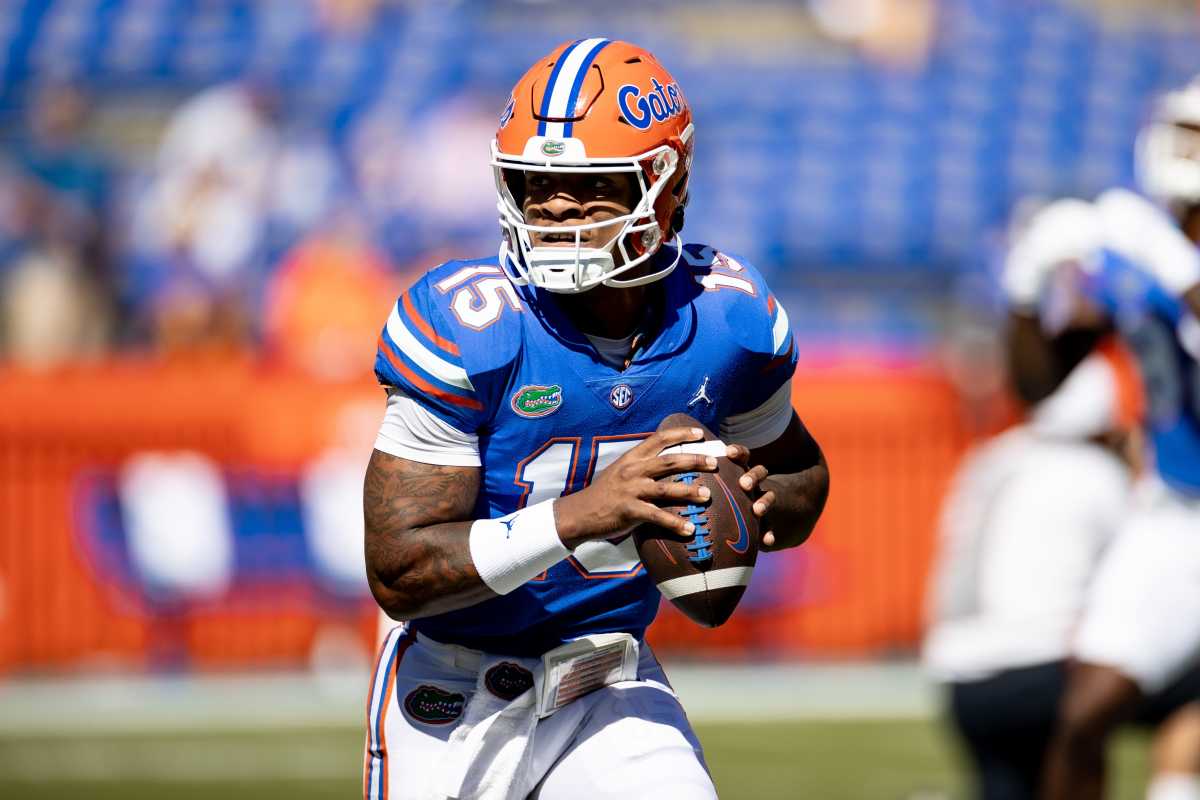Seahawks Risk Losing Geno Smith Due to Strong QB Draft Class?
Over the past several weeks, the Seattle Seahawks have hammered out negotiations with quarterback Geno Smith on a long-term extension with the general consensus being that if a deal wasn't reached before the March 7 deadline, they would apply the non-exclusive franchise tag to him.
With the aforementioned deadline rapidly approaching following the conclusion of the annual NFL Scouting Combine in Indianapolis, Smith has yet to sign on the dotted line. Assuming an extension isn't reached before the clock strikes midnight on Tuesday, this undoubtedly increases the odds of him being tagged at $32.4 million fully guaranteed for the 2023 season.
But while it would be a surprise for Seattle to allow the Pro Bowl quarterback to potentially hit the open market, such a possibility may be more likely than most realize for several reasons.
For one, general manager John Schneider has never been a fan of utilizing the franchise tag. In his previous 13 seasons at the helm, the Seahawks have only used the tag twice, with kicker Olindo Mare and defensive end Frank Clark being the only two players who received such designations. Unable to agree to terms on a long-term contract, Clark ultimately was dealt to the Chiefs for multiple draft picks, while Mare left in free agency after playing on the tag in 2010.
When asked about tagging Smith during his combine press conference earlier this week, Schneider took the high road and didn't offer any hints on whether or not the Seahawks would consider the possibility.
"That's not something I'm going to get into," Schneider said. "It's kind of like a tool, you know?"
Why has Schneider been averse to the tag? Since Seattle has typically preferred back-loaded contracts with few guarantees after the first two seasons, the franchise tag completely goes against that strategy. The non-negotiated value carries a fully-guaranteed cap hit equivalent to the one-year contract salary, creating a far bigger cap hit than multi-year contracts that can have such hits massaged with signing bonuses and other mechanisms.
In the case of Smith, the Seahawks would be absorbing a $32.4 million cap hit for 2023 if he received a non-exclusive franchise tender. At the moment, per OverTheCap.com, the team only has $24.4 million in cap space available and that doesn't account for rookie contracts. They would have to open up more than $7 million in cap space through cuts, extensions, or restructures to simply stay out of the red for the start of the new league year.
Secondly, Schneider and coach Pete Carroll haven't been shy about the possibility of drafting a quarterback with the No. 5 overall selection, which Seattle acquired from Denver as part of the blockbuster Russell Wilson trade a year ago. While some may view their comments as a smokescreen looking to drum up offers from other teams to trade down, they haven't had a chance to pick this high before and this may be their best chance to land an elite talent at the position.
As Schneider stated on Tuesday at the combine, quality quarterbacks "don't grow on trees" and if the organization falls in love with a prospect, they should do whatever they can to draft him even if Smith remains part of the team's plans for 2023.
Heading into the combine, this year's quarterback class already had drawn strong reviews from most draft analysts. Headlined by former Heisman Trophy winner Bryce Young and Ohio State star C.J. Stroud, the group also features two tantalizing physical talents in Kentucky's Will Levis and Florida's Anthony Richardson, who each put on shows in Indianapolis on Saturday.

Schneider and Carroll have always been enamored by unique athletic talents, as evidenced by their recent selections of receiver DK Metcalf and cornerback Tariq Woolen. Specifically in the case of Richardson, they may not be able to pass up the opportunity to draft a prospect who stands 6-foot-4, 244 pounds, ran a 4.43 40-yard dash, and posted a 40.5-inch vertical jump if he remains available when they are on the clock in April.
Possessing similar size, plus athleticism, and a cannon throwing arm of his own, Levis could be an option in the top 10 as well. In a trade down scenario, if still available, he may have too much upside for the Seahawks to pass up.
While Young and Stroud may come into the league ready to play right away and would be worth consideration trading up to draft if Seattle wanted to go that route, Richardson and Levis would be prime candidates to sit for a year behind Smith, as both signal callers will need time to develop as processors and improve their throwing and footwork mechanics. But they may also have higher ceilings because of their immense physical tools as passers and runners.
This opens up a world of possibilities for Carroll and Schneider as they draw closer to the start of free agency. They could re-sign or franchise Smith and draft one of the four top quarterbacks early, they could franchise the veteran and opt to pass on drafting a quarterback until later rounds or bypass the position completely, or they could let him test the market and roll the dice on a rookie playing right away.
Though they won't say it publicly, investing such draft capital at the quarterback position would lead many to believe the incoming rookie should play as soon as possible to take advantage of his affordable rookie deal. Smith's presence on an expensive, fully-guaranteed tag would prevent that from happening while also restricting additional moves that could be made to further fortify the roster around a young signal caller.
With negotiations between the Seahawks and Smith entering crunch time with the franchise tag deadline only 48 hours away, Schneider has a tough decision to make if a multi-year deal doesn't come together in quick fashion. While making a $32.4 million investment at the most important position in sports would be only the ninth-highest in the NFL in 2023, it would still significantly limit what the franchise can do at other positions this offseason.
Seeing intriguing players such as Stroud, Richardson, and Levis in action at Lucas Oil Stadium this weekend will only make that choice an even tougher one. There's no question Schneider has contemplated the benefits of starting a rookie quarterback and using extra funds created by Smith's departure to add premium talent elsewhere.
At the same time, Seattle loves Smith and both Schneider and Carroll have made it clear they would love to have him back following a breakout season. After making the postseason last year with him breaking several franchise records under center, including highest completion percentage, it would behoove the front office to extend the negotiations window by using the franchise tag with hopes of securing a long-term deal with lower cap hits before free agency begins on March 15.
Under those circumstances, re-signing Smith and potentially drafting a young quarterback in the first round would be more reasonable. The veteran could continue slinging the pigskin in Shane Waldron's offense while the youngster develops behind the scenes and at worst, that player could be a trade chip down the line if Smith maintains the starting job and continues to play at a high level. It's what the Packers were known for under general manager Ron Wolf when Schneider worked for their front office years ago.
Time will tell what ultimately happens, but answers should become more clear in the next few days. If Schneider does franchise tag Smith, they will have a little over a week to try and finalize an extension before the new league year. If a new deal isn't reached and the tag isn't deployed, suddenly things become much more interesting for the Seahawks at quarterback with free agency just around the corner.
Want the latest in breaking news and insider information on the Seahawks? Click Here to subscribe to AllSeahawks.com's Newsletter.
Follow All Seahawks.com on Twitter and Facebook
Make sure to subscribe to our daily podcast @lockedonseahawks today! Click here To Listen.
Want even more Seattle Seahawks news? Check out the SI.com team page here.
